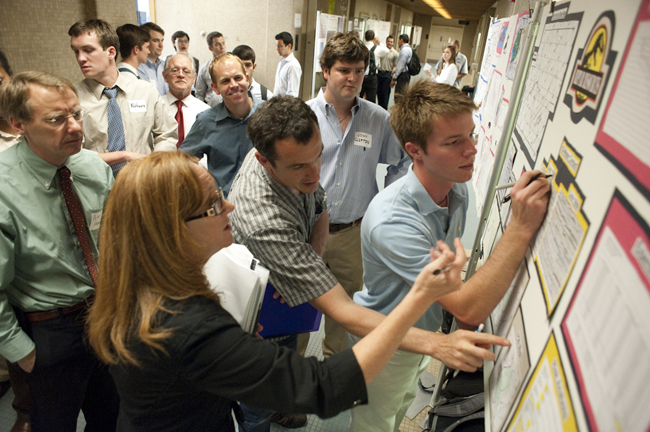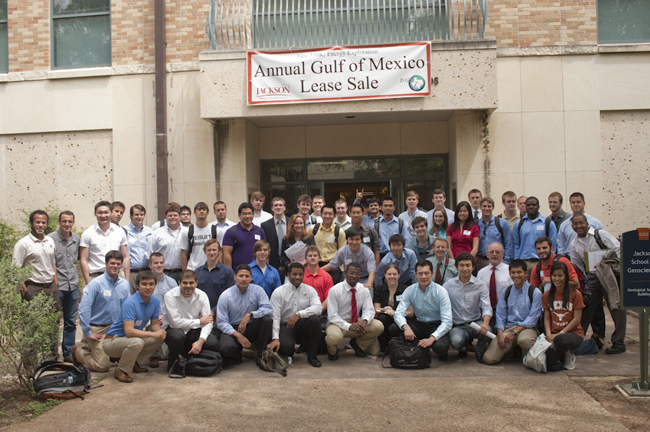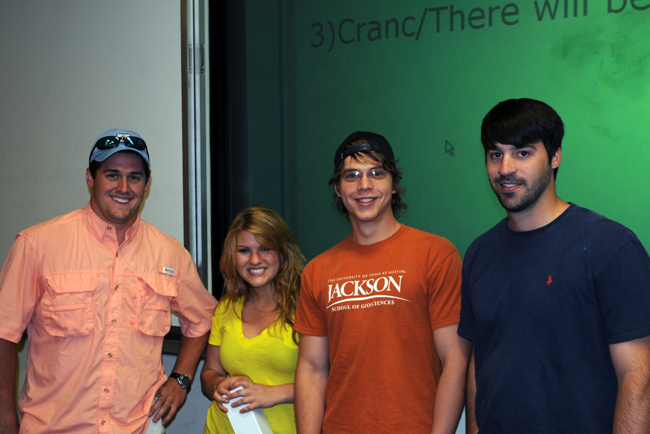Hands-on Learning: Lease Sale Competition
January 20, 2011

When the 125 geoscience and engineering students in the course Petroleum Geology: Basin and Trend Analysis returned from Spring Break last year, it was to what can only be described as the mother of all Monopoly games.
The students were asked to form imaginary oil and gas companies and conduct a hydrocarbon assessment of an area in the Gulf of Mexico. Chevron supplied them with real world seismic and well log data. The “bank” gave each team a total of $250 million of play money to do their analysis (they could buy extra seismic data, for example) and to bid on leases. At the end of five weeks, they would select blocks to bid on in an imaginary federal lease sale. Judges from Chevron, as well as the instructors and TAs for the course, would select the winners.
Peter Flemings, who developed the course with co-instructors Ron Steel and Xavier Janson, said the lease sale sprouted from his strong conviction that students learn the best when they’re solving problems.
“We can talk all day about concepts in class,” said Flemings, “but I believe it’s the act of forcing the student to take the information and make a map and integrate different information that forces the learning.”
Students came up with team names that ranged from the authentic sounding (Imperial Oil & Gas), to the school spirit-filled (Bevo Oil & Gas), to the whimsical (Enron 2.0, Graben Goblins, and Reptar Resources).

The project gives students a taste of life working in the oil industry. They use real data from a region that has actually produced significant amounts of oil. They follow industry methods for analyzing the data, assessing risk, estimating costs and establishing lease bids. Perhaps most importantly, said Flemings, they work in mixed teams with earth scientists and petroleum engineers.
“This is an environment that is extremely common in industry, where engineers and geoscientists have to work together, but I don’t think it happens much in college,” he said. “It’s certainly one of the first formative experiences where those folks have to learn together.”
“The best part was the interdisciplinary team work,” said Steven Gohlke, Undergraduate Geological Society chapter president and member of the Reptar Resources team. “That’s something I’ll deal with every day at work in industry. We come at things from a different perspective and that’s a good thing. It made our prospect better. No other class gets us working together like this.”
At the end of the five weeks, a maze of posters snaked through the ground floor hallways of the geosciences building. Then starting at 8:00am on a Tuesday morning and continuing well past 4:00pm, the instructors, teaching assistants and three guest judges from Chevron interrogated the 27 teams in what seemed like an unending blitz of 15 minute speed dates.
The next day, the students poured into the lecture hall to hear the results.
The judges revealed the area the students had pored over for five weeks to be a world class field in the Gulf of Mexico offshore Louisiana (you’ll have to take the course to find out which one). They noted that most teams focused on one area that was indeed a good target, but missed three or four other much more valuable fields in the area. For the field they did focus on, they tended to overestimate reserves, which led them to overbid for lease blocks. But overall, the judges were quite impressed with the thought and hard work the students put into the project.

Finally, the judges revealed the winning team was Premier Coastal Exploration.
The class is designed to give students a leg up in the competitive oil industry. Chevron also considered it a smart investment of their time and energy.
“We do take notes on individuals who stand out and pass those on to our recruiters,” said Ellen Clark, geophysicist with Chevron. “It also helps the students get to know Chevron and our personality. For me personally, I enjoy getting to meet the students and see their unbridled enthusiasm for the oil industry.”
The course is being offered again in spring 2011.
by Marc Airhart
For more information about the Jackson School contact J.B. Bird at jbird@jsg.utexas.edu, 512-232-9623.
